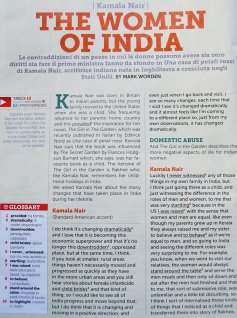
one more issue to write and talk about, but first let us thank the so many students who read and the ones who, in addition to working in the classroom, decide to leave part of their work on the web as a comment. So far, Ilaria, the one who welcomed us, Cristina, Lucia and Franca. Thank you, Ladies. We hope so many others will find it useful to have more opportunities to practice and compare written production with others’ ones. We are trying to simplify the procedures to access the blog, and make real English work of our pages for whoever wants to practice, improve, find different subjects to explore with other people sharing the same interests.
In the long run, reading other people’ writings will help to develop styles, communication, compare ideas and preferences.
After each page, we would like to keep files in the archive to be consulted, all the different subjects proposed, to see how any input has been used to produce something of your own. There will be a progress, visible, measurable and meaningful, each student will be able to verify it.
Several years ago, while preparing a university student for an English exam of hers, we also read a book written by an Indian - American writer, Jhumpa Lahiri, who won the Pulitzer Prize in 2000 with her debut collection of short stories, “Interpreter of Maladies”. So many other students read it enthusiastically.
First homework for Low – Intermediate/Intermediate students: try to find the information you think is more significant about this writer, and write down just a short paragraph to frame the general subject and give our readers the details that impressed you most.
Elementary students: trust yourselves and start reading the first paragraph of the article we publish today, The Women of India, Speak Up, June 2012, then rephrase the content into three very short and concise sentences.
Be grammatically correct, subject, verb and adjunct, Present Simple and Past Simple.
This other Indian – British - American author you can read about here, opens a window on this different world, the one of women in India. A similar story, born in Britain to Indian parents and moved to the States.
Up to you to find your own connections with other subjects; one comes to my mind because of one more Pulitzer Prize. It is a film called Finding Forrester. Have you seen it? If not, do it, of course in English, subtitled. You will have the opportunity to listen to the unmistakable Scottish accent, a perfect diction, of Sean Connery. Make an advantage of watching films. It's not only for your English, but for your enjoyment too, even if so many times they can be even more than that. .
We will talk very soon about watching videos and films together.
All the best, enjoy your English, Anna – Coordinator



Comments
The women of India
Kamala Nair wrote about status of women of India in her book “the girl in the garden”,recently published in Italy too.
Kamala was born in Britain and grown up in the United States,but she frequently goes to India,her parents' country.
During in an interesting interview Kamala answers to many questions about her place of origin.
Kamala thinks that her country moves in a positive direction, because when she visits her relatives,she sees many changes about the role of women and men.
Kamala was raised with the sense that women and men are equal, so in her book describes the more negative aspects of life for Indian women,because she hopes this nouvel helps the women to leave this sort of submissive role and to be masters of own life.
IN India there are very big contradictions:the first nation to elect a femal prime minister and all the others still not considered and even oppressed.
In the 2000 she won the Pulitzer with her book The Interpreter of Maladies.
This book is a collection of short stories about lonely people very far from their birth place, in searching someone can understand their feeling.
Jhumpa used her characters to explain to her readers that happyness is very close to us and she wants us to understand the importance to keep with us our tradition in every place that we decide to live.
In one of her story there is a couple that have lost their son.
They discover the difficulty to communicate one to another, their scared to talk about this disgrace, but one day they decide to do it.
the story doesn't have an happy end because the writer wants to show us the real face of life.
Ilaria